Future of Work: Create a Culture of Lifelong Learning in Your Organization
The rate of organizational change is much faster than anyone could have ever predicted, and the long-anticipated future of work is officially here. Today, technological innovation characterizes almost every industry advancement, yet many organizations fail to revolutionize their internal systems and practices. With new skills, roles, and responsibilities, comes new work preferences and management styles.
As a professional responsible for upskilling and reskilling your staff, are you equipped with the knowledge to create a culture of learning? It’s one of the best solutions for keeping up with the demands of an evolving world and should no longer be treated as an additional company benefit, but rather a necessity for survival.
GetSmarter explores the implications of a changing world in ‘The Future of Work Is Here’ report. With over 8,000 respondents globally, the research sheds light on the driving forces behind change in business. The shift in skills and jobs has made upskilling overwhelmingly urgent – for both individuals and organizations – and continuous learning offers a competitive advantage that can’t be ignored. The businesses that adapt and evolve their culture and facility for lifelong learning will be the ones that stand out.
There’s a lot of uncertainty in navigating a rapidly changing future. Still, worldwide, businesses are recognizing the need to adjust and adapt organizational structures while addressing a shift in skills. As a result, continuous learning has become a necessity. Employers are now faced with an exciting challenge: our working world sits at a juncture where Industrial Age practices meet Information Age patterns. Employers are tasked with navigating a new age of work, with the current revolution bringing as much change in a decade as previously spread over a century.1
How, then, do we navigate a culture of learning that’s relevant to every employee?
It’s time to adapt management practices
Younger professionals (Millennials and Generation Zs) – some of whom have never known a world without the Internet – are starting to influence the workforce. Communication is expected to be instantaneous, and the conventional 9–5 in-office work schedule is being called into question. With hours, locations, cultures, and systems being re-evaluated, traditional management practices are faced with radical changes in attitudes towards work. To attract, retain, and engage talent, organizations will need to embrace these values:
- Equality
- Freedom
- Flexibility
- Work-life balance
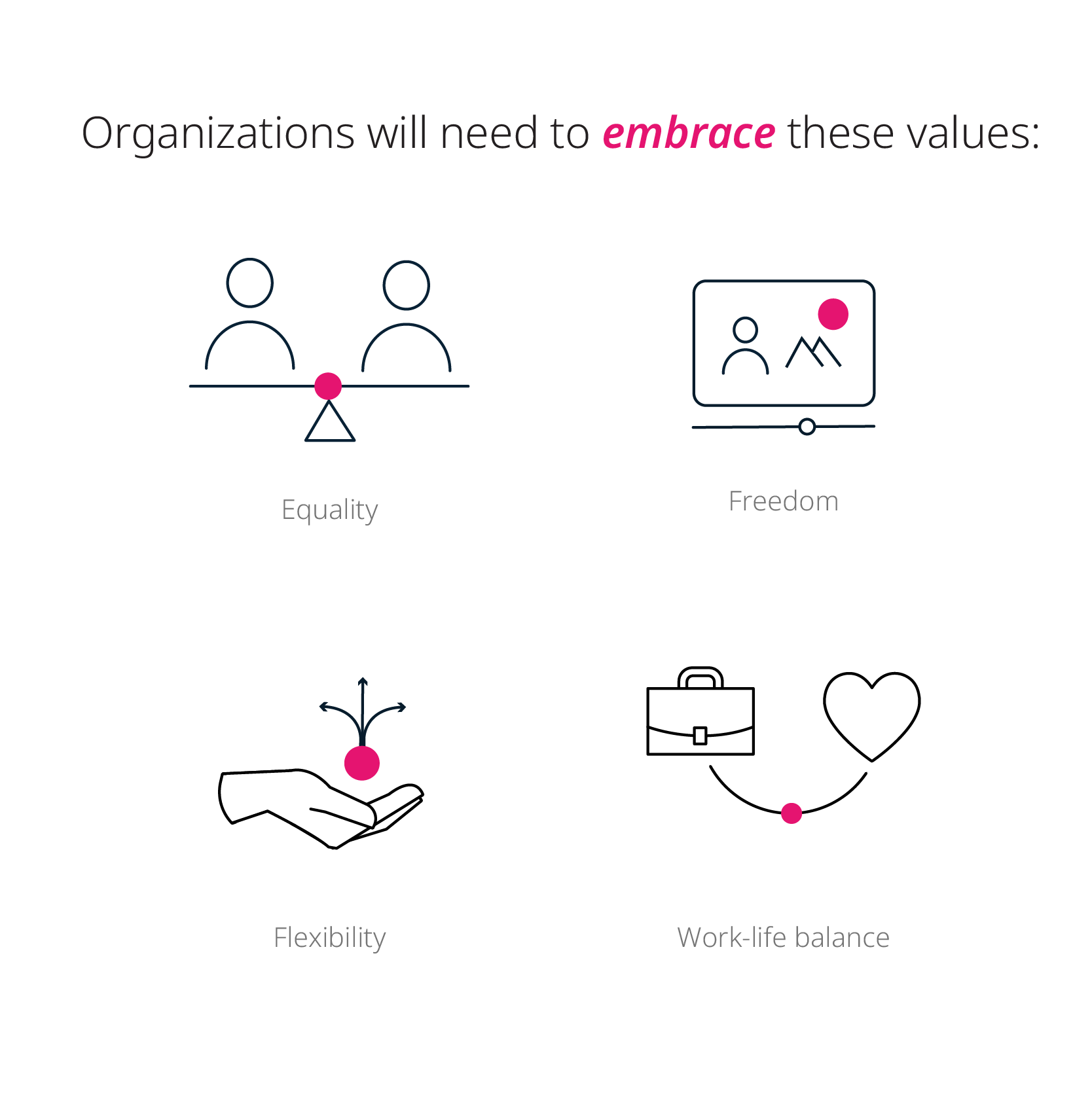
Company culture has also become a differentiating factor among organizations, and acts as an effective drawcard in recruiting and retaining top talent. As a context for performance and employee engagement, a company’s culture will be increasingly monitored, managed, and curated by design, as opposed to being adopted by default.2
With digital transformation at the forefront, businesses need to guarantee that their workforce is equipped to meet tomorrow’s needs. Enabling a space of lifelong learning will also ensure that, despite an employee’s age, experience, or capabilities, acquiring new skills via learning initiatives is supported and encouraged.
The importance of continuous learning and professional growth
Continuous learning is now an integral part of working, and it’s not exclusively about remaining relevant in the job market.
Employers, learning and development (L&D) managers, and HR professionals need to address the economic inequality being created by the technical advances of the Fourth Industrial Revolution – especially for lower-skilled workers.3 A workplace culture that prioritizes the skills development of existing labor forces is a holistic solution to this challenge.
GetSmarter asked HR, L&D, and talent managers why they think it’s important to develop employees. Among the top reasons were:
- Gaining a competitive advantage.
- Filling existing skills gaps.
- Increasing employee engagement.
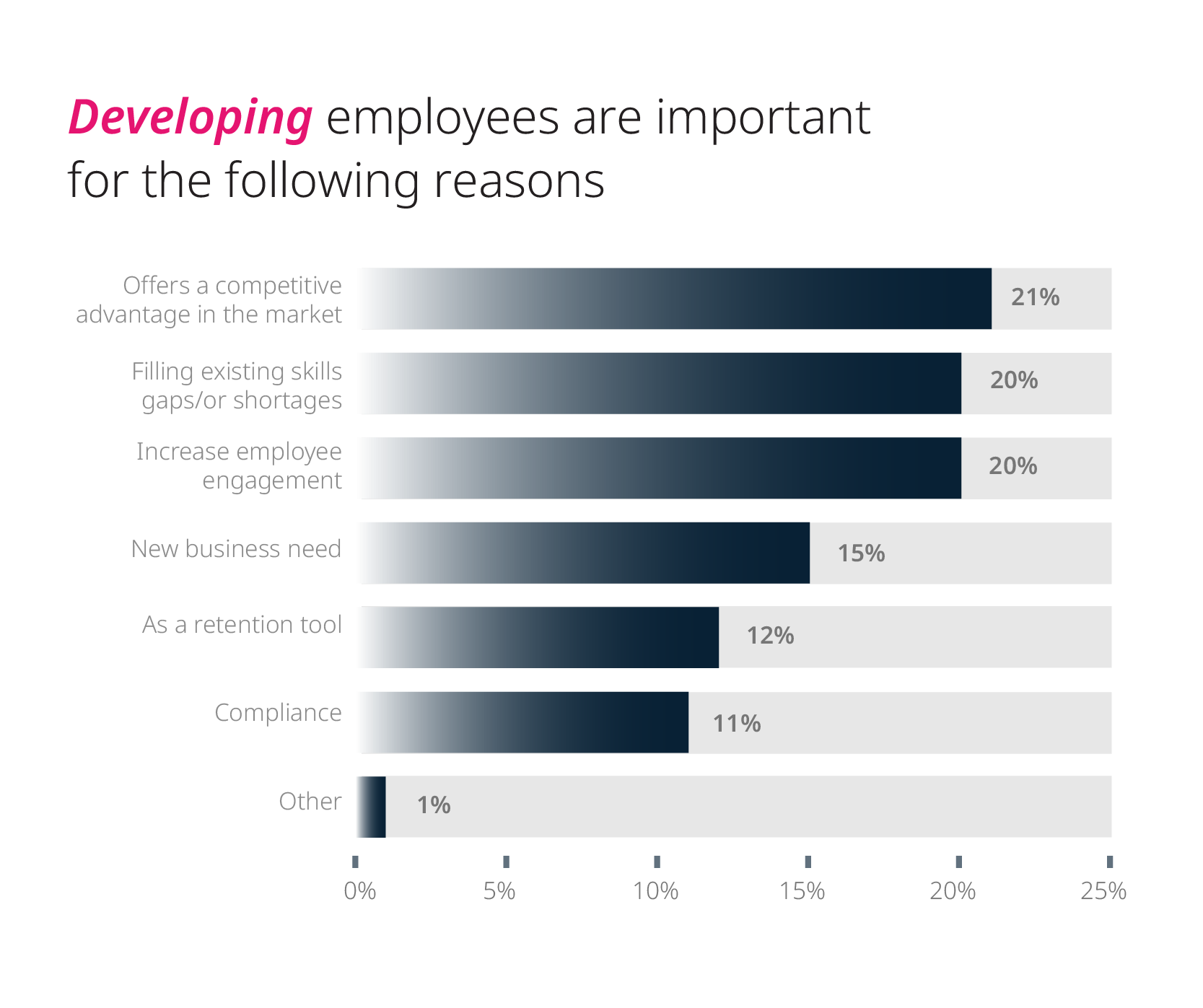
The survey results shed light on the critical need for L&D opportunities. As we navigate the future of work, training needs to be at the forefront and become a key component for addressing some of the challenges companies face in ensuring that their employees’ skill sets are up-to-date.
The value of lifelong learning to an organization
Employee development is also directly linked to business outcomes. ‘The Future of Work Is Here’ report shows that companies with agile learners react quickly to the evolving demands of business, and are better prepared to leverage new ideas for a strategic edge.
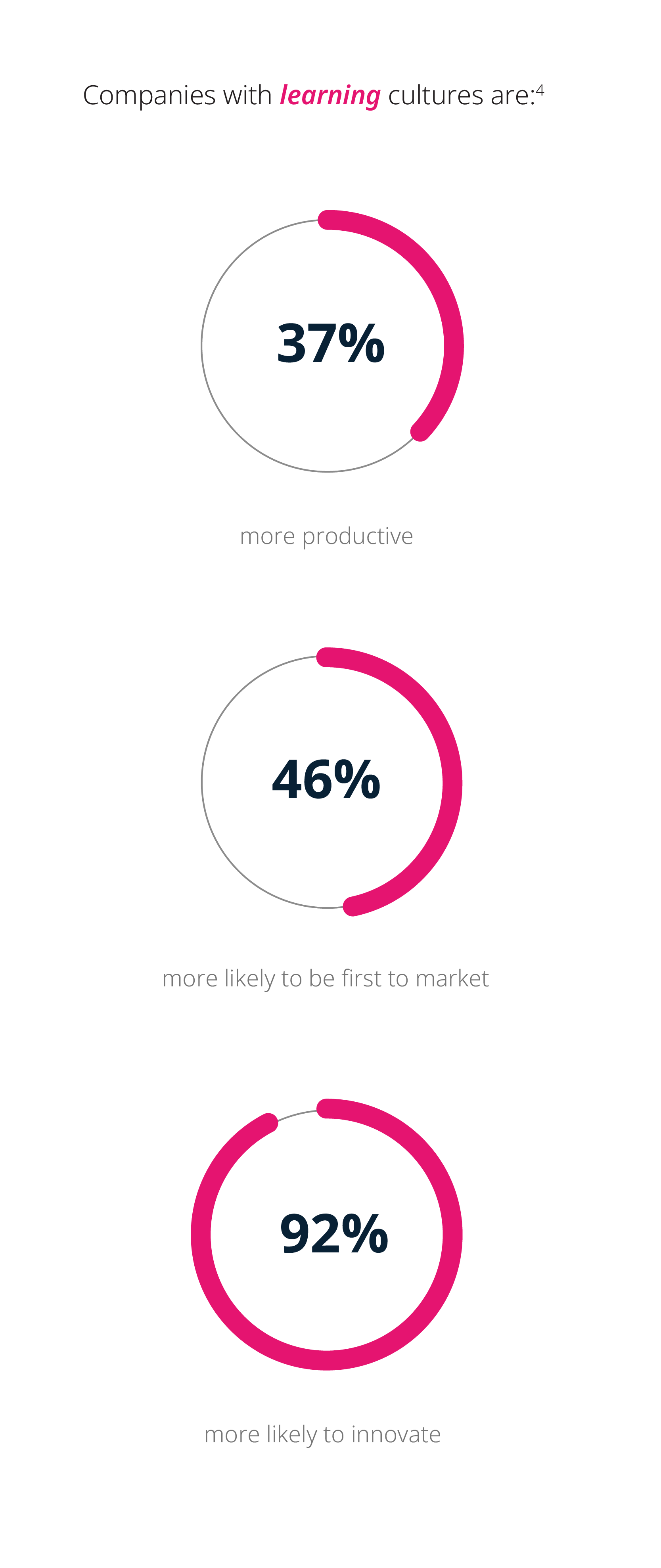
A culture of learning is a powerful solution to change, and it’s likely to set an organization up as a market leader. But the benefits don’t stop at business outcomes. Lifelong learning is critical to overcoming HR-specific challenges.
The value of lifelong learning to HR and L&D managers
When L&D managers were asked what their number-one challenge was, the majority said: employees who are unaware of their skills or performance gaps, followed by developing leaders.
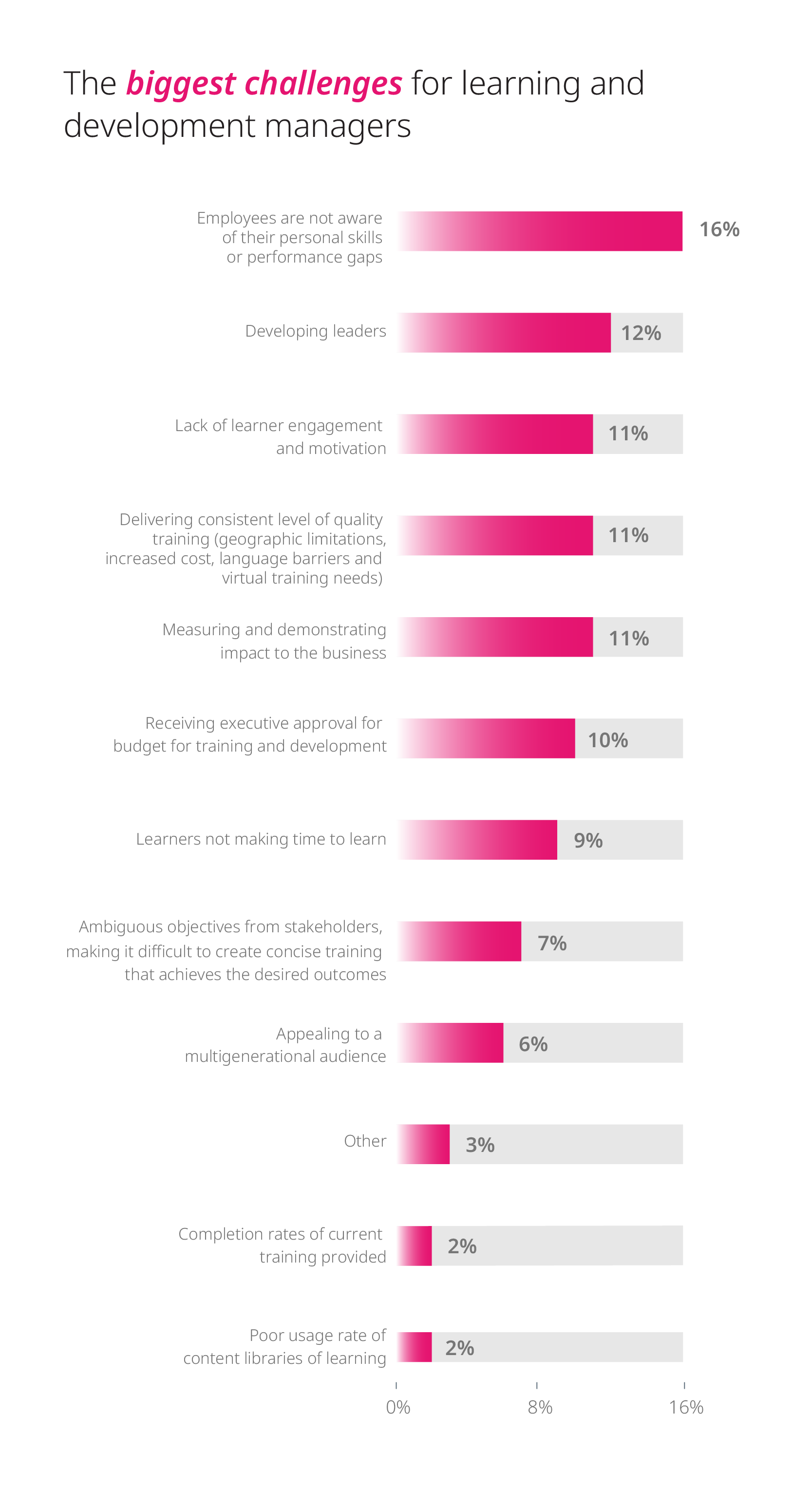
Engaging employees through skills-development is a solution to some of the workplace challenges HR professionals experience, and thus worth prioritizing. Along with the strategic business benefit of professional growth, successful training programs also contribute to attracting and retaining top talent. Research shows that more than 92 percent of employees feel more engaged after being given learning and development opportunities.
How to enable a culture of learning
Luckily for HR professionals and employees, learning has become easy and accessible. With access to books, online courses, development programs, podcasts, and other available resources, making a habit out of lifelong learning is viable. The sheer extent of development and training programs (from micro online learning courses to more formal skills-based certificates) reveals how interconnected continuous learning and the future of work are.
The research findings reveal that 33 percent of respondents identify the value and role of continued learning and skills-based certificates in securing their current positions. This is supported by recruiters, with talent professionals identifying continued learning as one of the top elements they look for in a prospective candidate’s CV.
As a business leader or professional involved in getting your team up to speed with the latest skills and knowledge, you have access to online learning solutions. GetSmarter offers a range of courses within training, development, and change management to ensure you’re equipped to manage the demands of upskilling and future workforce needs.
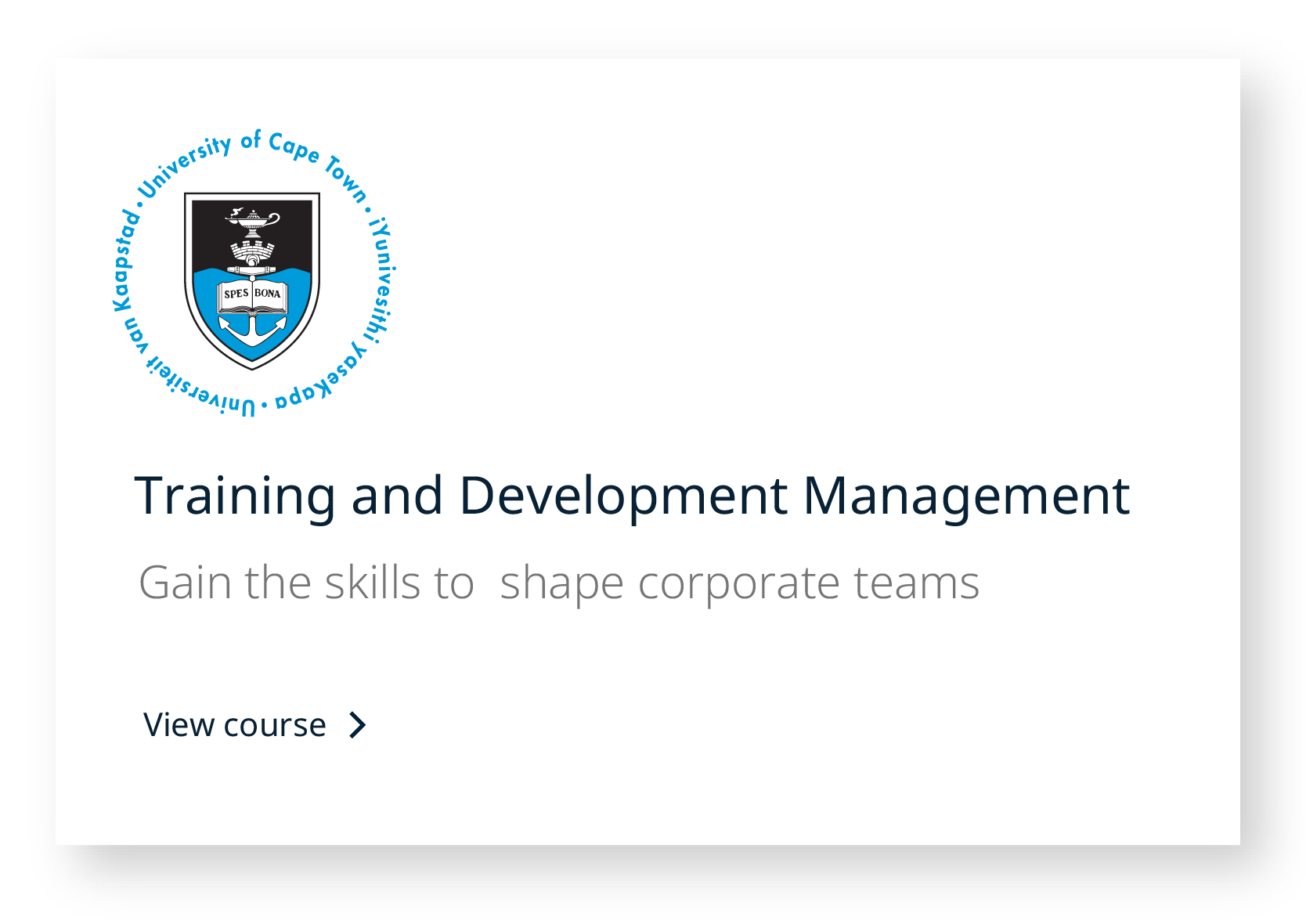
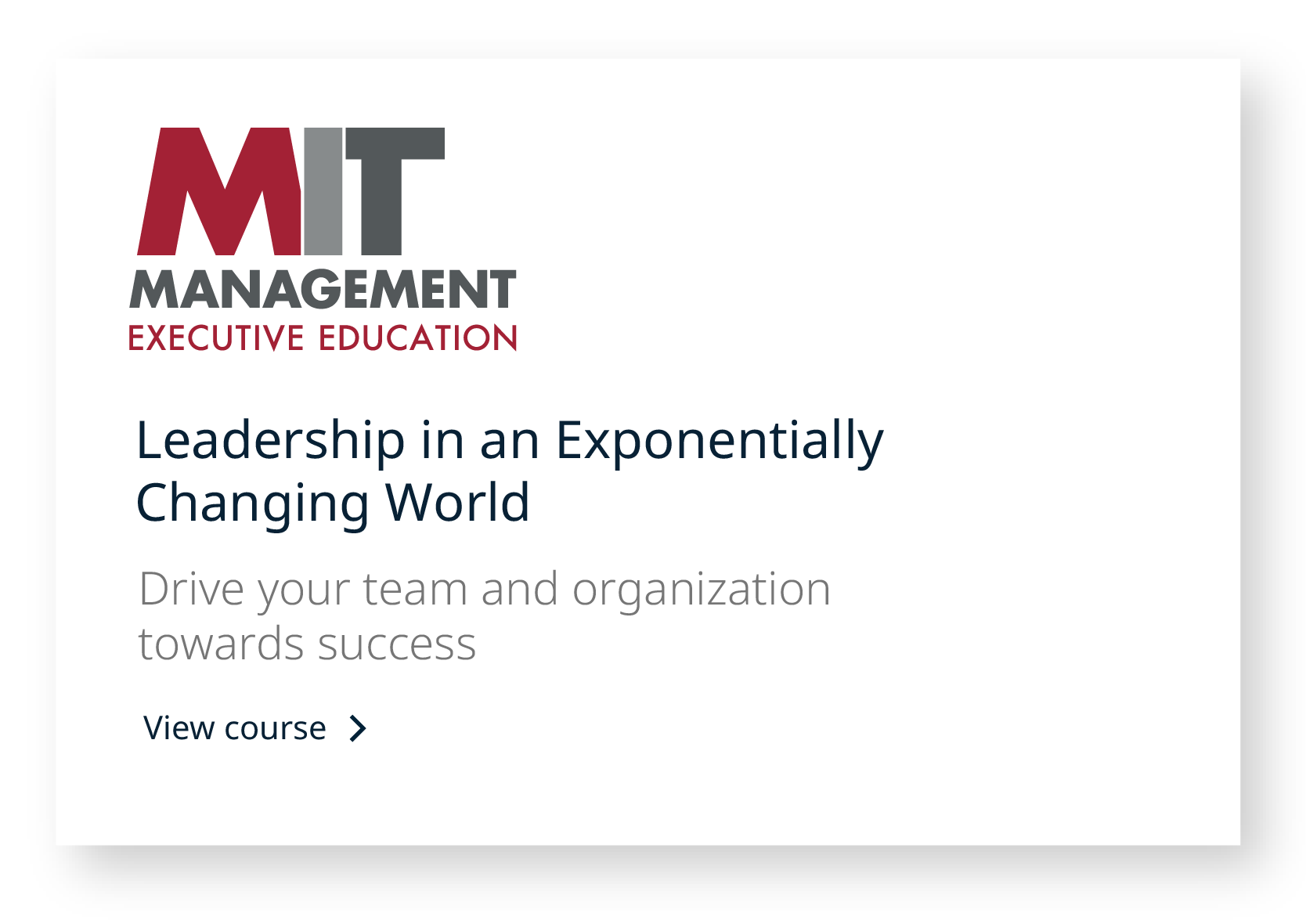
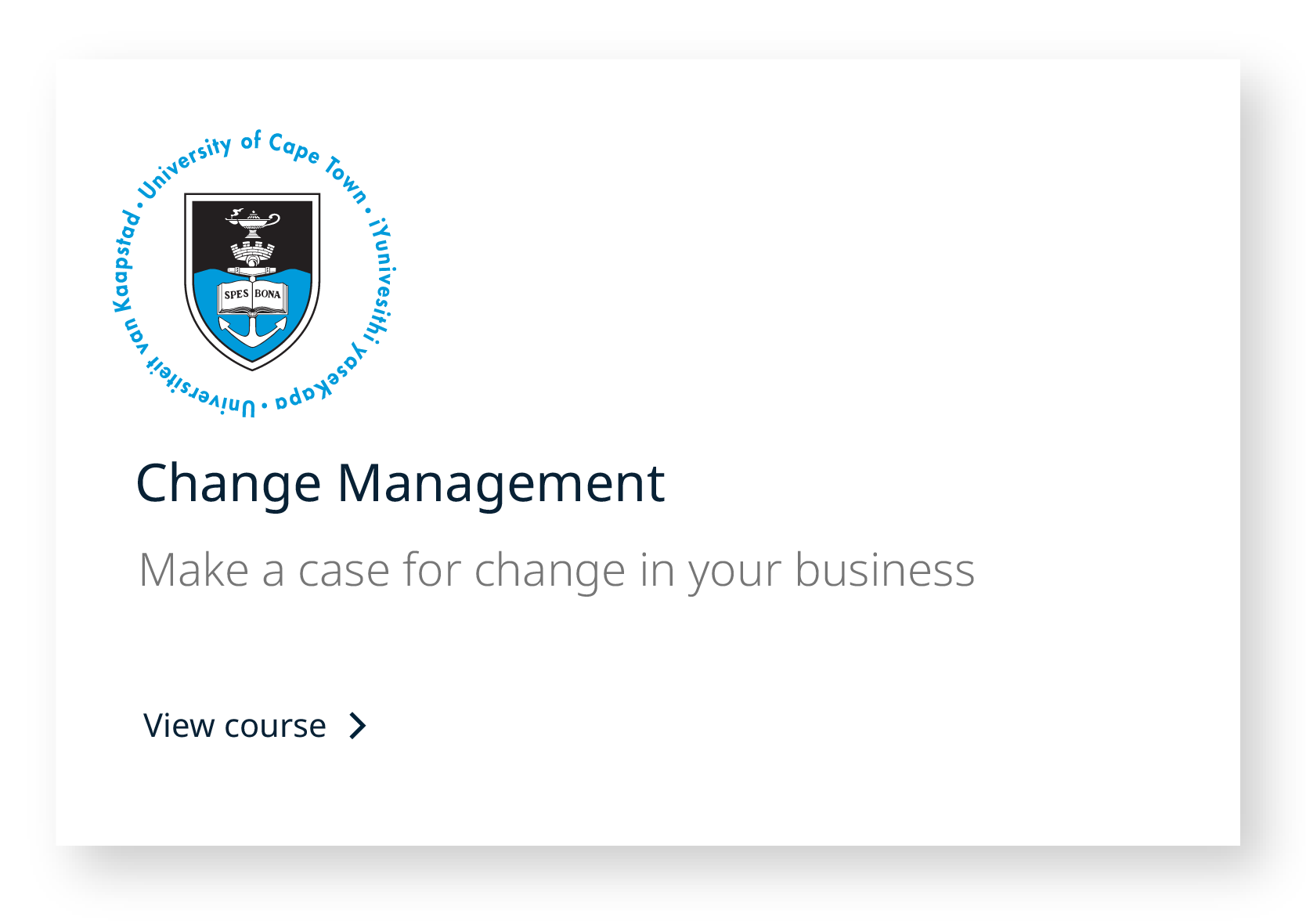
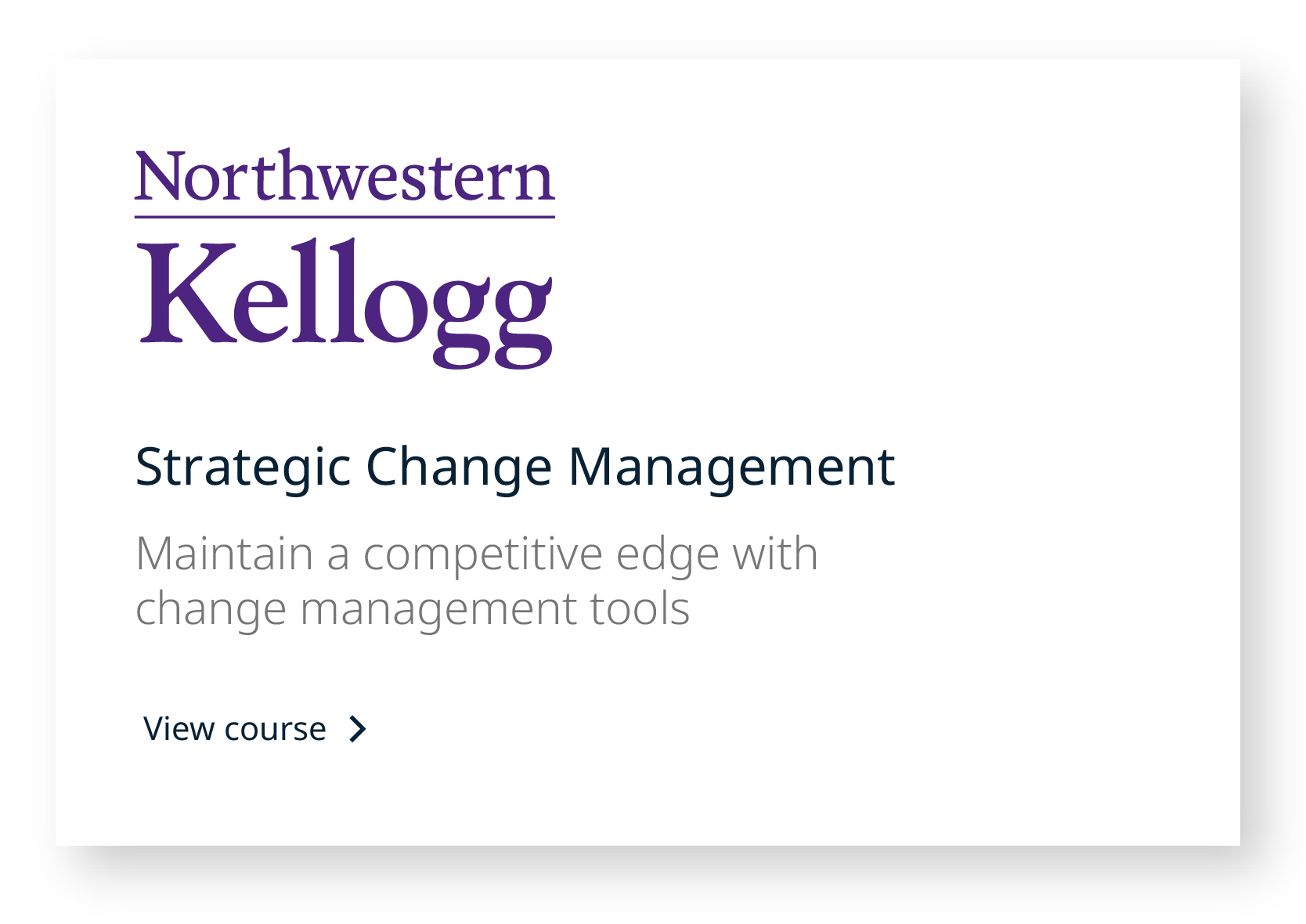
Online learning has also proven effective in teaching technical as well as interpersonal skills. As the working world gets increasingly technology-driven, human-based skills rise in value – so much so that it’s become a differentiating factor within the labor market. Offering these learning opportunities helps address the skills gap your business may be experiencing, whilst also developing your talent’s capabilities and, in turn, contributing to your business’s success.
Though the urgency of upskilling staff may seem daunting, the responsibility doesn’t fall solely on the shoulders of HR and L&D professionals. Over half of the GetSmarter report respondents believe it’s a joint responsibility between the individual and the organization. Businesses that want to remain competitive have an obligation to not only provide training opportunities, but also to foster a learning culture that encourages employees to upskill themselves.
The skills gaps businesses need to address
Recognizing the gap in your workforce’s competencies is the first step to tackling them. However, there are varying perceptions regarding where skills gaps exist within organizations. Both HR team members and people managers believe leadership skills need the most attention. At the same time, individual contributors consider the most significant gap to be interpersonal skills, which include communication and negotiation.
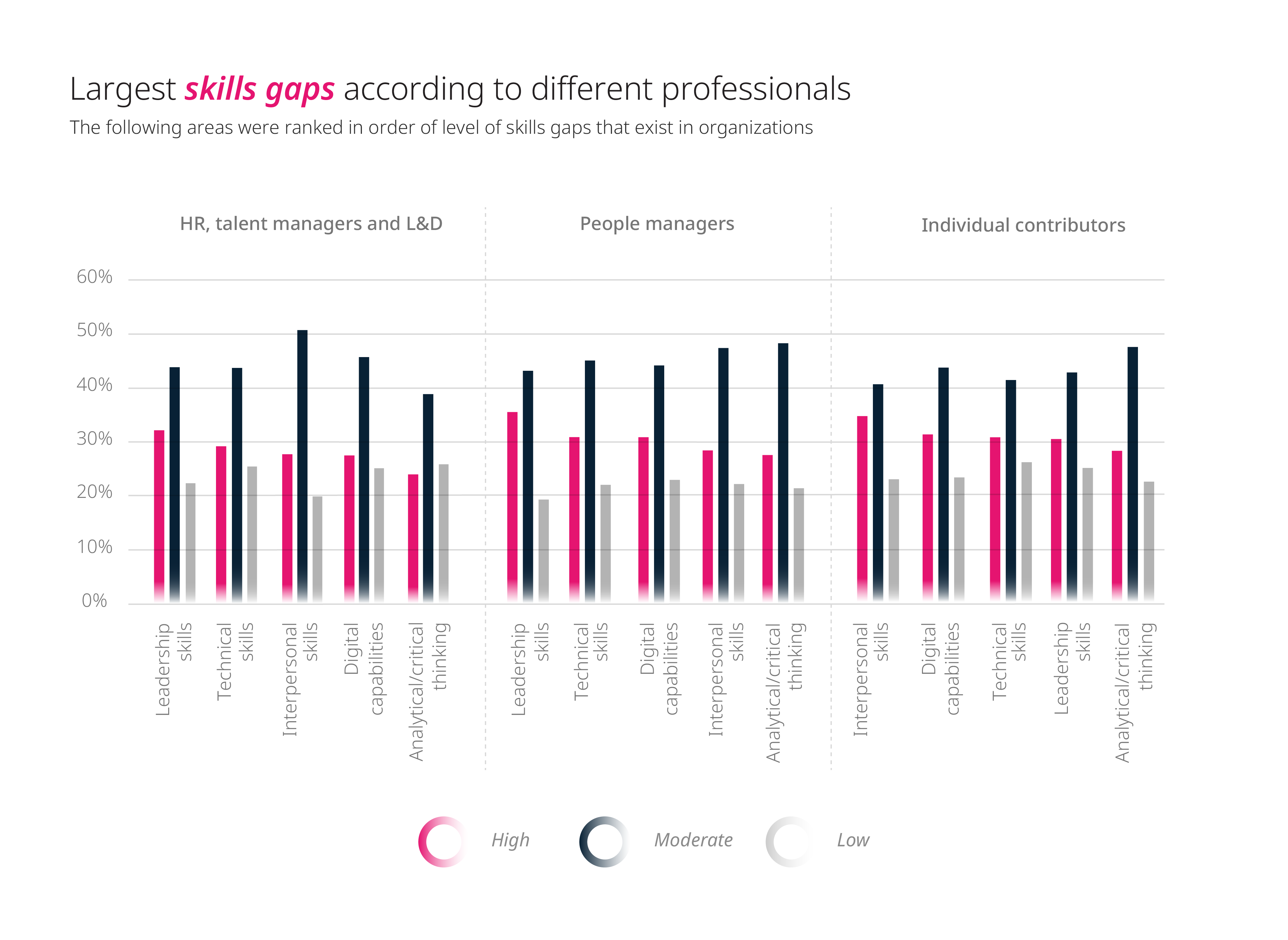
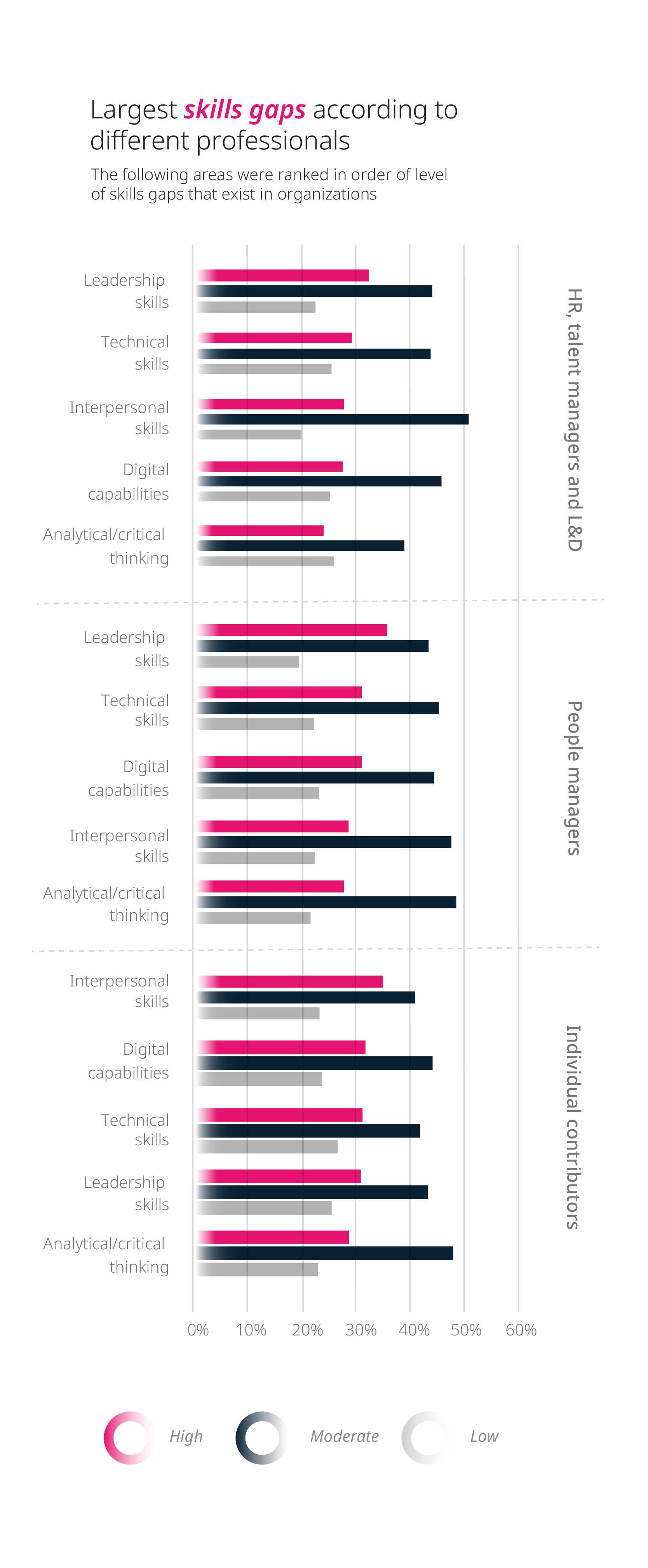

People managers and individual contributors believe that digital capabilities feature highly, as opposed to those in HR who rank them as the least pressing concern. What is clear is that the need for soft skills, such as leadership and interpersonal skills, is likely to grow. Those in hiring positions shouldn’t necessarily focus on candidates with technical skills, but rather those with the capabilities that machines can’t mimic.
What to look out for on CVs
Recruiters who want to build a learning culture should look for evidence of continued learning on future candidates’ CVs. This indication of professional development reveals that the worker can adapt to the demands of change.
Interpersonal skills are now among some of the most sought after by employers. These include social skills, communication, collaboration, emotional intelligence, problem-solving, decision-making, and critical and analytical thinking capabilities.
Surprisingly, job titles hold far less weight today than they did in the past. Instead, a candidate’s expertise and willingness to grow their skills will be what lands them the job.
Of HR, L&D, and talent managers, 68 percent believe that skills-based certificates are a valuable signal of capability. Seventy-two percent believe that, with the increasing need to upskill and the current rate of technological change, skills-based certificates will become an even more valuable stamp of capability in the next two years.
Evidence of continued learning shows employers:
- A worker’s intent to learn and grow
- The right attitude and a willingness to adapt
- Experience and extent of knowledge
- A commitment to work
As we venture into a future of work driven by technology, characterized by change, and influenced by Millennials and Generation Zs, our capacity and facility to learn need to be stronger than ever. The traditional workplace model no longer suits the needs of an evolving labor force and advancing economy. This shift has brought about a desire for meaningful work and an organizational culture that supports growth, with professional development a prerequisite for keeping up with the rate of change.
HR, L&D, and talent practitioners are tasked with reshaping a corporate space that meets the needs of employees and businesses. To ensure a team is fit for the demands of a changing world, continuous learning needs to become as integral to business practice as shareholder meetings. Employers can no longer rely on simply hiring top talent – they need to create it.
Explore ‘The Future of Work Is Here’ report.
Stay competent, confident, and informed
Sign up to our monthly newsletter to receive the latest course information, expertise from renowned thought leaders, and a summary of our most recent blog articles.
- 1 Thomson, P. (Nd). ‘New ways of working in the company of the future’. Retrieved from OpenMind. Accessed July 21, 2020.
- 2 (2020). ‘Managing Your Culture by Design Rather Than Default’. Retrieved from Steelcase.
- 3 Milano, M. (Mar, 2019). ‘The digital skills gap is widening fast. Here’s how to bridge it’. Retrieved from the World Economic Forum.
- 4 (Nd). ‘Leading in learning’. Retrieved from Deloitte. Accessed July 21, 2020.